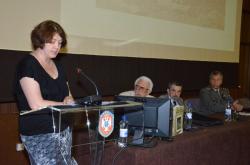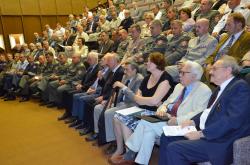- About MoD
Minister and Associates
- Minister
- State Secretary
- Assistant Ministers
- Secretary of the Ministry of Defence
Sectors
- Defence Policy Sector
- Human Resources Sector
- Material Resources Sector
- Budget and Finanance Sector
- Sector for Infrastructure and Hospitality Services
- SAF
- Documents
- Services
- Sport
- Archive
- Contacts
25.09.2012.
Symposium on the medical services in the Balkan wars
 In commemoration of the 100th anniversary of the beginning of the Balkan wars, a Symposium "Serbian military ambulance in the Balkan wars” was held in the Military Medical Academy." Organizers of the event are the Department of Health of the Ministry of Defence and the Academy of Medical Sciences of the Serbian Medical Society.
In commemoration of the 100th anniversary of the beginning of the Balkan wars, a Symposium "Serbian military ambulance in the Balkan wars” was held in the Military Medical Academy." Organizers of the event are the Department of Health of the Ministry of Defence and the Academy of Medical Sciences of the Serbian Medical Society.The symposium was opened by Colonel Zoran Popovic, MD chief of the military health care department. He reminded the present that the history of military medicine and medical services in Serbia was 170 years old and was inextricably linked with the fate of the state and nation.
- During the Balkan wars, the Serbian military ambulance was an important functional part of the army, as well as an active support in providing medical care during all major battles. Doctors, nurses, paramedics were often in the forefront, always willing to truly and fully assist the injured and sick, often risking their own lives. It is with solemnity that we remember all the members from founders to the present day, from unknown heroes, to those most renowned and glorious Serbian military doctors who spread the glory of our military medicine not only locally but also globally. The glorious history of our medical service obligates us to adequately respond to today's challenges and, accordingly, plan our future activities of the demands and challenges of the times, he said Popovic.
The participants were welcomed by Pavle Milenkovic, MD, president of the Academy of Medical Sciences of the Serbian Doctors Society. He pointed out that the Academy in the past four years had co-organized 6 symposiums dealing with the functioning of military medical services.
 The topics on the symposium were the political and military situation in Serbia during and before the Balkan wars, the most important operations in that period, medical services and the Serbian army military medical doctrine, the principles of triage, treatment and evacuation of the wounded and the sick, medical activities of three trains, surgical treatment of wounded, infectious diseases and epidemics, functioning of field hospitals, the Serbian Red Cross, medical service losses. The activities of the medical corps during the Bregalnica and Kumanovo battle were given special attention. There was talk about the work and medical missions in the Balkan wars of Russia, namely a stage field hospital "Moscow City".
The topics on the symposium were the political and military situation in Serbia during and before the Balkan wars, the most important operations in that period, medical services and the Serbian army military medical doctrine, the principles of triage, treatment and evacuation of the wounded and the sick, medical activities of three trains, surgical treatment of wounded, infectious diseases and epidemics, functioning of field hospitals, the Serbian Red Cross, medical service losses. The activities of the medical corps during the Bregalnica and Kumanovo battle were given special attention. There was talk about the work and medical missions in the Balkan wars of Russia, namely a stage field hospital "Moscow City".The papers were exhibited by Aleksandar Nedok, MD, Milisav Sekulic, Branislav Popovic MD, Professor Veljko Todorovic MD, prof. Brana Dimitrijevic, MD, Nebojsa Stankovic, MD, Dragan Mikic, MD, Jovan Maksic, MD. Jovan Mladenovic, PhD, Vesnabaltic and Luka Nikolic. Special guest from Russia was Galina Igorevna Shevtsova.
In conclusion, the participants could hear that in this period, our war surgery was at a high level, the surgeons achieved maximum results and achievements in war surgery that era. At the same time, the Serbian Medical Corps, for various reasons, proved unable to combat the outbreak of infectious diseases- especially dysentery, typhoid, cholera and malaria, so it is no wonder that the losses in the Serbian army are said to have been greater due to infectious diseases than weapons
- About MoD
- Jurisdiction
- Organisation scheme
- Description of duties
- Minister and Associates
- Minister
- State Secretary
- Assistant Ministers
- Secretary of the Ministry of Defence
- Sectors
- Defence Policy Sector
- Human Resources Sector
- Material Resources Sector
- Budget and Finanance Sector
- Sector for Infrastructure and Hospitality Services
- Special Internal Units
- Office of the Minister of Defence
- Secretariat
- Military Attorney's Office
- Administrative Bodies within MoD
- Defence Inspectorate
- Military Intelligence Agency
- Military Security Agency
- Autonomous Departments
- Public Relations Department
- Military Healthcare Department
- Higher Education Institution
- Defence University
- Specific internal units
- Inspector General of the Services
- Internal Audit Section
- SAF
- Documents
- Services
- Sport
- Archive
- Contacts

